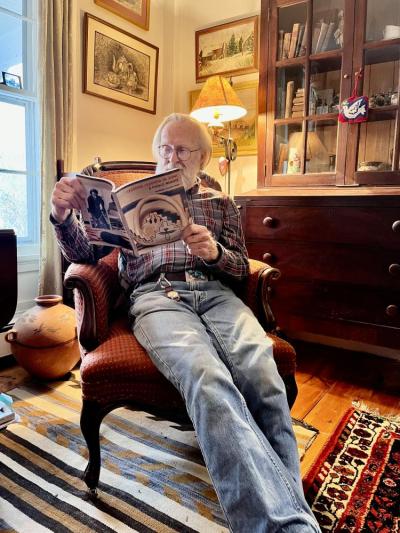Lakeville author and former Apponequet teacher to give talk on book
Event has passed
LAKEVILLE — Sometimes life comes down to a series of specific moments.
For longtime Apponequet High School Teacher Richard Tripp, he isn’t sure if he would have become an English teacher if it hadn’t been for a supportive conversation in high school. And he’s not sure if he would have been the same person he is today if he hadn’t spent three pivotal years of his life teaching English at a high school in the Zuni Pueblo.
Tripp was one of the first students to graduate from Apponequet High School when it opened in 1959. At the time he had already signed up to go study business in college, but his high school English teacher suggested a different route.
“I had an English teacher who said to me… ‘you’re planning to be an English teacher, aren’t you?’” Tripp explained. “He said several things [about me] that were very kind and nice and, I hope, true.”
That conversation stuck with Tripp, and after studying business, he realized that he would be better off as a teacher and got a second degree at Bridgewater State University.
That was where, by chance, he ended up on a journey that would see him travel away from Lakeville and teach English on a Native American reservation.
Walking through Bridgewater State University before he was due to graduate, Tripp met a group of people who were recruiting for a program called VISTA, or Volunteers in Service to America.
“One of their films that they were showing [to recruit people for VISTA] was a girl working on the Navajo reservation in New Mexico,” Tripp explained. “I had never been to the West and the geography there looked really inviting.”
A few years later, after working as a teacher in a hospital, Tripp got a job teaching in Zuni, a Native American reservation between New Mexico and Arizona.
“I was living in a foreign culture. Everybody looked very different than I did,” Tripp said.
“Most of the teachers there were not there for the best of reasons,” Tripp explained. “Some of them were there because they couldn't hold down jobs any other place.”
Teaching at the high school in Zuni came with a set of challenges for Tripp, he said. Most of the students there spoke English as a second language, and they felt alienated by the curriculum, which didn’t refer to indigenous people in a positive light.
One of the changes Tripp made was he started teaching books that featured indigenous people.
The students at the high school were given the “books that every kid in the United States had, which were all geared to white kids,” Tripp explained. “Any references to Indians were negative. You know, the word savage or lots of other words that were just not culturally very good.”
“I wrote to the publishing companies and I said: ‘I'm on a reservation. I have kids who don't have culturally appropriate materials. I can't get any money to buy textbooks. Can you send me 30 copies of [various books]?’”
The new books sparked his students’ interest in his class and “won them over,” Tripp recalled. “It just made teaching quite easy because they wanted to read [the material],” Tripp said.
Tripp said that during his time at the Zuni reservation, he was a student as well as a teacher, and spent time learning about pottery and weaving. He also got married to another teacher.
“It was a unique experience and it changed my whole life,” Tripp said. “I learned to weave there and… I’ve been a weaver ever since.”
He also served as a leader of the native dance group at the school, he said, along with a worker at the school who was Native American herself.
Eventually, after three years at the reservation he came back to Lakeville, in part because he missed his family, he said.
“Zunis were very closely related to their families, they did things together all the time, and I saw what I was missing in my own life,” he said.
Even after Tripp left the reservation, he stayed in contact with the people he met there, he said. He hosted the daughter of one of his students from the reservation in Lakeville for two years so she could attend high school at Apponequet, after the former student told him that his daughter wasn’t learning enough at the high school on the reservation.
“If that guy hadn't been trying to get people to join VISTA that afternoon at Bridgewater [State University], and if I hadn't gone through Boyden Hall and seen him there, none of this would have happened,” Tripp said.
“I wouldn't be married to the person I'm married to or have the kids I have,” he added.
After he retired from his job as a teacher at Apponequet High School in Lakeville, Tripp wrote a book about his time at the Zuni Pueblo, titled “Lessons Learned in Zuni.” He is giving a talk about his book at the Unitarian Universalist Church of Middleboro on Thursday, Jan. 25 from 7 to 9 p.m. Later this year, Tripp will give a second talk about his book at the Lakeville Library on Monday, Feb. 26 from 6:30 p.m. to 8.
Those wishing to purchase a copy of the book can do so by emailing trippatwindyhill@yahoo.com.
He wrote the book, he said, in part because “I wanted my children and my grandchildren to know about a very important time to me.”
Event has passed














